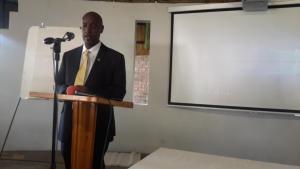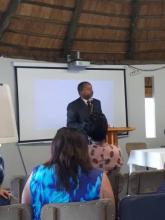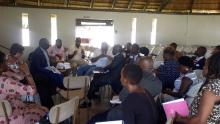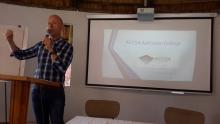Zimbabwe holds a stakeholders workshop on the treatment of substance abuse
The Ministry of health and Child Care (MOHCC) convened a partners meeting for dialogue on the treatment of substance use disorders on the 1st of February 2018. This came at the realization of the growing problem of substance use disorders as shown by reports from institutions managing mental health problems.
Apart from mental health institution managing substance use disorders the country does not have a programme to attend to substance use disorders, although there are scattered organizations supporting the communities in different aspects of the problem including health education, support programs for quitting as well as treatment of substance use disorders.
The occasion drew attendance from most organizations and individuals dealing with substance abuse and substance use disorders including the MOHCC, the UN represented by WHO, The Zimbabwe Republic Police (Drug section), Medicines Control Authority of Zimbabwe, Pharmacists, and NGOs.
The Deputy director mental Health noted that while there is increasing prevalence of psychoactive substance use among patients admitted to psychiatric units in Harare there is also emergence of new psychoactive substances including illicit alcohols and cough syrups. The use of the cough syrups is associated with younger males residing in high density neighborhoods. She indicated that the data available is insufficient to show the real magnitude of the drug problem in the country. She pointed out that this stakeholders meeting was supposed to result in the nomination of a Taskforce to draft a policy statement, national standards and guidelines for treatment and rehabilitation in Zimbabwe based on consultations and international guidelines by June 2019. This would be followed by upskilling of health staff in addictions care.
While speaking on the same occasion the WHO Representative for Zimbabwe, Dr Alex Gasasira, hailed the strong Ministry of Health leadership in Mental Health as well as organizing this workshop. He noted that the problem of substance abuse is increasing and requires a broad stakeholder participation for prevention and treatment. Some of the key prevention strategies included taxation of commodities that are normally on the market but have adverse effects on health like alcohol and tobacco as well as control of illicit trade and trafficking of drugs, tobacco and other substances. He emphasized that more work needs to be done in prevention of problems associated with substance abuse, including public awareness and provision of expertise and facilities for quitting. He reiterated the role of WHO in supporting the MOHCC in this area including the support that has already been given in mhGAP training.
The honorable Minister of Health and child care, Dr Obadiah Moyo, in his opening remarks highlighted adverse health effects of alcohol and substance use including chronic diseases, intentional and nonintentional injuries including road traffic accidents as well as infections due to risk behaviors. He bemoaned the gap in the treatment of substance use disorders leading to poor access to these services. He emphasized the need to formulate policies and guidelines for universal access to treatment and rehabilitation of affected people in line with SDG target 3.4. This required a multi-disciplinary and multi-sectoral approach.
Several speakers from civil society and academia as well as from other countries including South Africa and United Kingdom gave their experiences with substance use and substance use disorders. The presentations focused on the need, the gap and the heavy cost required to tackle substance use disorders and the necessity to engage Government and Private health funders in the quest to find a solution to substance use problems.






